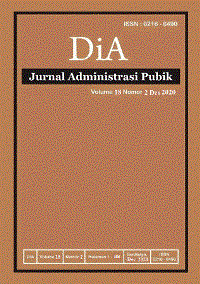POLICY OF CHINA'S DEBT-TRAP DIPLOMACY: The Influence Of Media In Forming Community Political Opinions
DOI:
https://doi.org/10.30996/dia.v18i2.4410Keywords:
Belt and Road Initiative Policy, China, Policy of debt-trap diplomacy, Pakistan, Sri Lanka, IndonesianAbstract
The term debt-trap or Chinese debt trap originated from the introduction of the Belt and Road Initiative (BRI) policy by Chinese President Xi Jinping in 2013 which aims to connect the Eurasian economy with infrastructure, trade, and investment. Debt trap diplomacy is related to the cases that occurred in Sri Lanka and Pakistan. In Indonesia, the policy on cooperation projects in the infrastructure sector existed before the BRI policy was signed and then increasingly under the BRI banner. However, if seen from the SULNI June 2020 data, the value of Indonesia's debt to China is around 1% and the cooperation is mostly in the field of productive infrastructure. If the policy of Indonesia-China cooperation is carried out properly and continues to be introspective both inside and outside, then development funding under the BRI banner can produce good results and can avoid debt bondage. In Indonesia, where most of the people have negative sentiments towards Chinese policies, this often happens and is framed for political consumption which is disposed of to the public through mass media and then used to lead opinions through discussions on social media.
Downloads
References
Anonim. 2017. The ‘New Great Game’: China’s Debt-Trap Diplomacy. Amsterdam: European Foundation for South Asian Studies
Brautigam, Deborah. 2020. A Critical Look at Chinese ‘Debt-trap Diplomacy’: The Rise of A Meme. London: Regional Studies Association
Clarke, Michael. 2017. The Belt and Road Initiative: China’s New Grand Strategy?. Washington: The National Bureau of Asian Research
Departemen Statistik Bank Indonesia. 2020. External Debt Statistics of Indonesia – June 2020. Jakarta: Bank Indonesia
Dollar, David. 2019. Understanding China’s Belt and Road Infrastructure Projects in Africa. Washington: The Brooking Institution
Emory S. Bogardus (1951) The Making of Public Opinion, American Journal of SociologyVolume 57, Number 4, New York: Association Press.
Mukrimin, (2013) The Influence Of Mass Media In Political Change In Indonesia, Politika: Jurnal Ilmu Politik, vol. 3, no. 2, pp. 57-67.
Saraswati, Ni Made V. 2019. Jurnal Kajian Lemhanas RI edisi 38 : Menilik Perjanjian Indonesia-China dalam Kerangka Belt an Road Initiative (BRI) dalam Perspektif Ketahanan Nasional. Jakarta: Jurnal Kajian Lemhanas RI
Setyanti, Wening. 2018. “China’s Debt-trap Diplomacy” di Era Xi Jinping Studi Kasus: ‘Kekalahan’ Sri Lanka dalam Proyek Hambantota. Yogyakarta: Departemen Ilmu Hubungan Internasional FISIPOL UGM
Sumarto (2020), Forming Community Culture In Advancing Education, Study Of The Community Ideology Guards Community (KPIB) In Higher Education, Prodising ISID, 1(1), 28-39. Issue No. 1 (2020): Seminar Internasional.
Wening Setyanti & Nanang Pamuji Mugasejati (2018) “China’s Debt-Trap Diplomacy” Di Era Xi Jinping Studi Kasus: ‘Kekalahan’ Sri Lanka Dalam Proyek Hambantota, Departemen Ilmu Hubungan Internasional FISIPOL UGM, Yogyakarta.
Wolf, Charles dkk. 2013. China’s Foreign Aid and Government-Sponsored Investment Activities: Scale, Content, Destinations, and Implications. Santa Monica : RAND Corporatio
Wijaya, K., & Syairozi, M. I. (2020). Analisis perpindahan tenaga kerja informal Kabupaten Pasuruan. Jurnal Paradigma Ekonomika, 15(2), 173-182.
Downloads
Published
How to Cite
Issue
Section
License
The DiA journal allows authors to retain the copyright of their papers without limitation. Authors may grant publishers non-exclusive publishing rights to publish articles. Granting first publishing rights to publishers also qualifies as unlimited copyright (because there are no restrictions imposed by publishers on author copyright).







